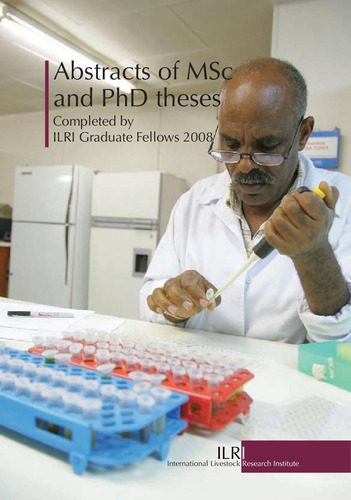Abstracts of PhD and MSc theses completed by ILRI graduate fellows 2008
Abstract
The International Livestock Research Institute (ILRI) is one of 15 future harvest
centres, which conduct food and environmental research to help alleviate
poverty and increase food security while protecting the natural resource base.
Building on three decades of experience, ILRI works at the crossroads of livestock and poverty by bringing high quality science and capacity building to bear on poverty reduction and sustainable development. As part of its research-based outreach and capacity strengthening, ILRI assists its partners by offering opportunities for long- and short-term training for researchers and
development practitioners. Capacity building is a core priority of ILRI because of the important role it plays in economic growth and development as well as addressing the rapid changes in the bio-physical, socio-cultural, technological and policy environments of the agricultural innovation systems in the developing as well as the developed world.
ILRI offers individual and group training courses. Both are aimed at largely building the capacity of the individual. Individual training is focused on harnessing the skills and abilities of individuals to contribute to the realization of developmental goals, which may include improved livestock management systems and enhanced research outputs and outcomes. ILRI has five Categories of individual trainees: Attachment Associates, Student Associates, Technical Associates, Research Fellows and Graduate Fellows.
Graduate Fellows are mostly employees undertaking MSc and PhD studies.
Postgraduate training is a priority activity of ILRI as it contributes significantly to the research agenda of ILRI and to the national and regional human resource pool in many regions of the world. This group of graduates will continue the research on emerging issues and will form the core of future collaborative research and innovation partners of ILRI.
ILRI supports a number of Graduate Fellows every year. The outputs of their work would end up as thesis and various publications. Not every researcher, however, has access to these materials. The result of the research efforts of the Graduate Fellows have limited impact due to lack of wider circulation of their findings. This publication of the abstracts of the thesis work supported by ILRI as a compendium is one way to make sure that the results are widely distributed among the various research and development practitioners working within the livestock innovation system.
The purpose is to make the R&D community to be aware of the research work completed and the key findings. If you need additional information, please contact ILRI’s InfoCentre directly where copies of these theses are deposited.
We sincerely hope that this document will contribute positively in planning the future research activities and also will eliminate potential duplication of efforts.

